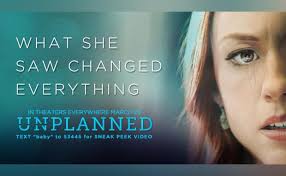On April 10th, I got in the car with my sister and drove to Ottawa for a private screening of “Unplanned”. I had read Abby Johnson’s book of the same title, and I wanted to see how her remarkable transformation from Planned Parenthood director to pro-life advocate played out as a movie. I settled into the screening room and felt the excitement of being surrounded by leaders in the pro-life movement from across the country. The lights dimmed and the film started. It was disturbing and bloody – such is abortion. It was unflinching, yet nonjudgmental – such is the truth extended in love. As we drove back home, my mind replayed the heart-wrenching scene depicting Abby’s abortion in her home. I was overcome with deep sorrow for the women who have lived through such a traumatic and excruciating experience. In confronting this truthful depiction of abortion, I was left with a deep sense of hope that the start of the end is here.
It is not politically correct to talk about abortion in Canada. Consider the last time, if indeed ever, you talked to someone about abortion in public. The conversation probably centered on rape, difficult circumstances of pregnancy, and the merits of choice. These are important topics to be sure, but they do not adequately replace a conversation about abortion itself. Denying this central conversation is delaying the protection of the preborn in Canada. Abortions continue in Canada not because people think killing innocent human beings is a grey issue, but because the truth of abortion is cunningly hidden away behind sidetrack conversations. The genius of “Unplanned” is that it finally unveils the root of the issue: abortion. The viewer is forced to do the same.
At the moment, pro-lifers are fighting to bring “Unplanned” to Canadian movie theatres. They launched a boycott campaign of Cineplex theatres, and it seems this is moving things forward in getting the film into the cinemas (Greenham, 2019). It is a little fishy that a pro-life film exceeding all box office expectations in the United States was refused by Canadian film distributors, but my speculations on that subject are of little value. Whether through Cineplex or private screenings, “Unplanned” is on its way. Canadians are about to come face to face with the sickening reality of abortion. This should be a time of great hope, gratitude, and confidence. As we move forward into this new phase, there are a few ways we might consider preparing.
We can first support the coming of “Unplanned” by joining the boycott and/or donating to private screenings. Visit www.canadawantsunplanned.ca for information on that. Second, we should ensure we are informed about the resources in our communities. This film will be impactful for those with previous abortion experiences. We ought to know the best supports we can offer for post-abortion healing and promote them as we are able. We can also investigate the best way to help men and women wanting to leave the abortion industry. Abby Johnson’s organization And Then There Were None was founded for this purpose and has helpful resources and FAQs on their website (abortionworker.com). Abby said there was a surge of people contacting them when the movie hit the theatres, and they have now helped over 500 people leave the abortion industry since they were founded in 2012 (Davis & del Guidice, 2019). If that isn’t a sign of hope, I don’t know what is! When the film finally arrives, our job will be to watch, bring others, and get the conversation rolling.
Welcome to Canada, “Unplanned”. We are ready!
Davis, D. & del Guidice, R. (2019, May 17). #463: Will Alabama take down Roe v. Wade?
[podcast]. The Daily Signal. Retrieved from https://www.dailysignal.com/2019/05/17/unplanned-is-driving-abortion-workers-out-of-the-industry/
Greenham, K. (2019, May 24). Makers of Unplanned movie ‘in negotiations’ toward
Cineplex screening deal. Grandin Media. Retrieved from https://grandinmedia.ca/unplanned-movie-makers-work-toward-cineplex-deal/?fbclid=IwAR0K7LwPbcZ-5XNZhii22FEb8QnoYFyg4nRJZQM1yViU_vwwcNk4UkA2Wu4










